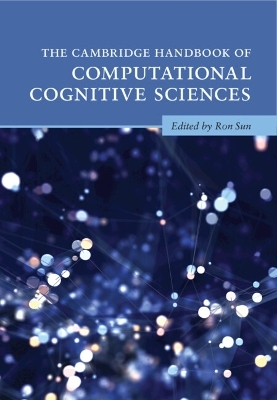
The Cambridge Handbook of Computational Cognitive Sciences
Cambridge University Press
978-1-108-48507-4 (ISBN)
The Cambridge Handbook of Computational Cognitive Sciences is a comprehensive reference for this rapidly developing and highly interdisciplinary field. Written with both newcomers and experts in mind, it provides an accessible introduction of paradigms, methodologies, approaches, and models, with ample detail and illustrated by examples. It should appeal to researchers and students working within the computational cognitive sciences, as well as those working in adjacent fields including philosophy, psychology, linguistics, anthropology, education, neuroscience, artificial intelligence, computer science, and more.
Ron Sun is Professor of Cognitive Science at Rensselaer Polytechnic Institute, New York. He has published numerous papers and books in cognitive sciences, including The Cambridge Handbook of Computational Psychology (Cambridge University Press, 2008). He was the recipient of the 1991 David Marr Award from Cognitive Science Society and the 2008 Hebb Award from International Neural Networks Society. He is a fellow of APS, IEEE, and other professional organizations.
Volume 1: Part I. Introduction: 1. An overview of computational cognitive sciences Ron Sun; Part II. Cognitive modeling paradigms: 2. Connectionist models of cognition Michael S. C. Thomas, James L. McClelland; 3. Bayesian models of cognition Thomas L. Griffiths, Charles Kemp, Joshua B. Tenenbaum; 4. Symbolic and hybrid models of cognition Tarek R. Besold, Kai-Uwe Kühnberger; 5. Logic-Based modeling of cognition Selmer Bringsjord, Michael Giancola, Naveen Sundar Govindarajulu; 6. Dynamical systems approaches to cognition Gregor Schöner; 7. Quantum models of cognition Jerome R. Busemeyer, Emmanuel M. Pothos; 8. Constraints in cognitive architectures Niels Taatgen, John Anderson; 9. Deep learning Marco Gori, Frédéric Precioso, Edmondo Trentin; 10. Reinforcement learning Kenji Doya; Part III. Computational modeling of basic cognitive functionalities: 11. Computational models of categorization Kenneth J. Kurtz; 12. Computational cognitive neuroscience models of categorization F. Gregory Ashby, Yi-Wen Wang; 13. Models of inductive reasoning Brett K. Hayes; 14. Analogy and similarity John E. Hummel, Leonidas A. A. Doumas; 15. Mental models and the algorithms of deduction Philip N. Johnson-Laird, Sangeet S. Khemlani; 16. Computational models of decision making Joseph G. Johnson, Jerome R. Busemeyer; 17. Computational models of skill acquisition Stellan Ohlsson; 18. Computational models of episodic memory Per B. Sederberg, Kevin P. Darby; 19. Computational neuroscientific models of working memory Thomas E. Hazy, Michael J. Frank, Randall C. O'Reilly; 20. Neurocomputational models of cognitive control Debbie M. Yee, Todd S. Braver; 21. Computational models of animal and human associative learning Evan J. Livesey; 22. Computational and cognitive models of reinforcement learning Kenji Doya; Volume 2: Part IV. Computational modeling in various cognitive fields: 23. Computational models of developmental psychology Thomas R. Shultz, Ardavan S. Nobandegani; 24. Computational models in personality and social psychology Stephen J. Read, Brian Monroe; 25. Computational modeling in industrial-organizational psychology Jeffrey B. Vancouver; 26. Computational modeling in psychiatry Cody J. Walters, Sophia Vinogradov, A. David Redish; 27. Computational psycholinguistics Matthew W. Crocker, Harm Brouwer; 28. Natural language understanding and generation Marjorie McShane, Sergei Nirenburg; 29. Computational models of creativity Sébastien Hélie, Ana-Maria Olteteanu; 30. Computational models of emotion and cognition-emotion interaction Eva Hudlicka; 31. Computational approaches to morality Paul Bello, Bertram F. Malle; 32. Cognitive modeling in social simulation Ron Sun; 33. Cognitive modeling for cognitive engineering Matthew L. Bolton, Wayne D. Gray; 34. Modeling vision Lukas Vogelsang, Pawan Sinha; 35. Models of multi-level motor control Martin Giese, David Ungarish, Tamar Flash; Part V. General discussion: 36. Model validation, comparison and selection Leslie M. Blaha, Kevin A. Gluck; 37. Philosophical issues in computational cognitive sciences Mark Sprevak; 38. An evaluation of computational modeling in cognitive sciences Margaret A. Boden.
| Erscheint lt. Verlag | 11.5.2023 |
|---|---|
| Reihe/Serie | Cambridge Handbooks in Psychology |
| Zusatzinfo | Worked examples or Exercises |
| Verlagsort | Cambridge |
| Sprache | englisch |
| Maße | 184 x 259 mm |
| Gewicht | 2700 g |
| Themenwelt | Geisteswissenschaften ► Psychologie ► Verhaltenstherapie |
| ISBN-10 | 1-108-48507-3 / 1108485073 |
| ISBN-13 | 978-1-108-48507-4 / 9781108485074 |
| Zustand | Neuware |
| Informationen gemäß Produktsicherheitsverordnung (GPSR) | |
| Haben Sie eine Frage zum Produkt? |
aus dem Bereich
